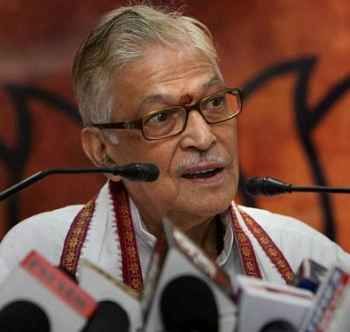 Younger party leaders are livid with the Murli Manohar Joshi-headed manifesto drafting committee for not taking their suggestions, reports Archis Mohan.
Younger party leaders are livid with the Murli Manohar Joshi-headed manifesto drafting committee for not taking their suggestions, reports Archis Mohan.
The Bharatiya Janata Party leadership is yet again at war with itself. This time, it is over the contents of the party’s yet-to-be-released manifesto.
Party leaders, particularly the younger lot, are livid at the Murli Manohar Joshi-headed manifesto drafting committee for not taking their suggestions on board and for producing a “shoddy and rambling” document lacking focus.
The party’s plan to release the manifesto on April 7 has further confounded its problems. It coincides with the first day of the 2014 Lok Sabha elections and might run into trouble with the Election Commission for violating the poll panel’s Model Code of Conduct.
Seeking to downplay the differences of opinion within the BJP, senior leader Ravi Shankar Prasad on Friday stressed that there were “no differences” within the party leadership over the manifesto. According to him, the release of the manifesto on the day of polling does not violate the code of conduct.
However, EC sources said Prasad’s interpretation of the code was incorrect, and his party would run the risk of inviting censure from the poll panel on April 7, the day five seats of Assam and one of the two Lok Sabha seats in Tripura go to polls.
“The release of manifesto can be viewed as offering inducement to voters,” said sources at EC.
The BJP, the EC source said, should either release the manifesto before the polling starts in the morning or after its conclusion in the evening.
However, the party isn’t convinced by EC’s argument. “We will release the manifesto in Delhi and not where the polling is being held. How is that any inducement to people of Assam and Tripura?” argued a BJP leader. He said EC's strict application of the code was impractical in the day and age of round-the-clock television. “Is it the EC’s argument that all public meetings across India should stop on the day that some states are going to polls because the public speeches and the promises made in the speeches are being telecast live.”
The day of the release of the manifesto is secondary to the primary concern to come up with a credible document. Party sources say the manifesto drafting committee has failed to incorporate several important suggestions from not only the party’s Prime Ministerial candidate Narendra Modi’s vision statements, but also several from such leaders as former finance minister Yashwant Sinha, senior leader Arun Jaitley and others.
Prasad on Friday claimed the manifesto has been drafted through a democratic consultative process, crowd-sourcing feedback from nearly 100,000 people across India. However, another source said the draft from Joshi has required many additions, particularly for its failure to integrate Modi’s vision document.
Jaitley on Friday chose to make his wish-list from the BJP manifesto public. “Even though it is for my party to decide collectively larger issues of policy, the opinion that I wish to canvas should be made clear,” he said.
He added the current income-tax exemption of Rs 2 lakh “should be gradually but significantly raised” to bring relief to small traders, mid-level public and private sector employees.
Jaitley said the initial loss of revenue would not be very significant, which will get recovered through indirect taxes when consumers spend this money. “The more the money velocity, the larger will be indirect tax benefits,” he said.
He demanded the BJP manifesto announce that small industrial units up to a turnover of Rs 5 crore be exempted from paying excise duty. Currently, all units with a turnover of Rs 1.5 crore and above have to pay excise duty.
Jaitley’s other suggestions included immediate implementation of the Goods and Services Tax (GST).
The manifesto, sources said, would now include Modi’s vision of an Indian Institute of Management, Indian Institute of Technology, and an All India Institute of Medical Sciences in each state to increase educational and job opportunities.
It would give special attention to the agriculture sector reform to put in place a national agriculture market, and a databank for agricultural produce.
Among the other promises are a price stabilisation fund to control inflation in the rates of cereals and vegetables, special courts to prosecute black-marketers, a data bank for agricultural produce, “more crop per drop” with advanced irrigation, date and soil health cards for farmers.
It will announce the creation of 100 smart cities and twin-city concepts, beti bachao, beti padhao programme, housing for poor on purchasing power parity basis, revive construction of highways as well as the river inter-linking project and announce an ambitious plan to lay new railway lines, particularly for the bullet train golden quadrilateral to connect 26 cities.
Party sources said the manifesto would focus on reviving the economy, containing inflation and employment generation through huge public projects such as building affordable housing and lay new railway lines.
They said the BJP's pet issues, such as the Ram temple, will not find much prominence as the party wants to contest the elections on the issue of corruption and development.











